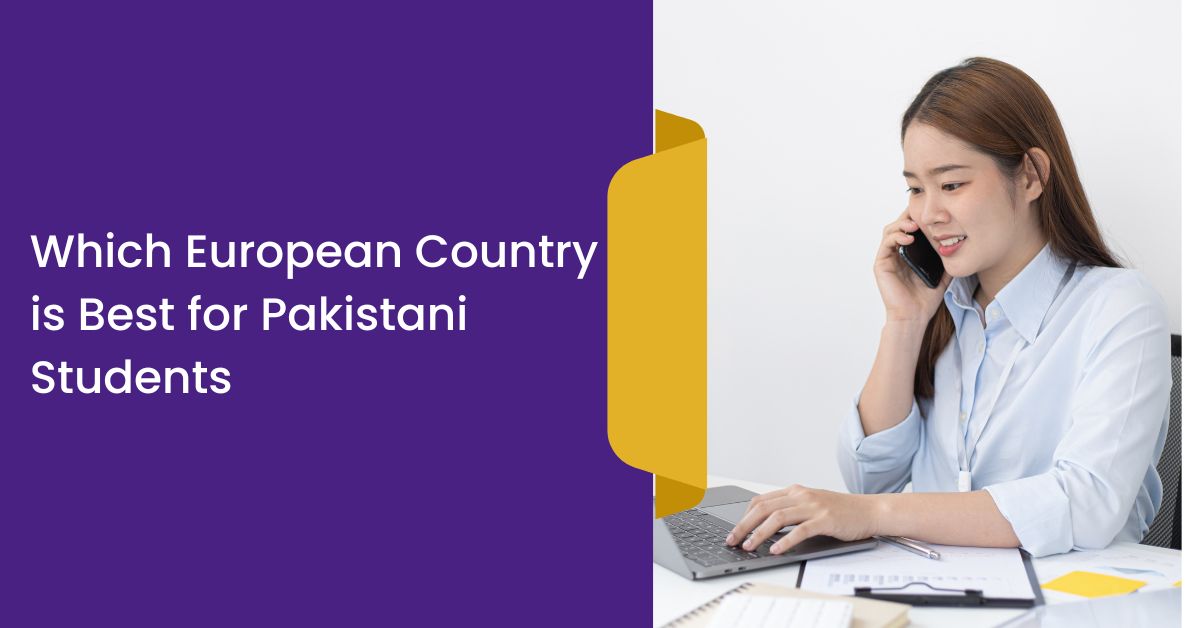Which European Country is Best for Pakistani Students
Dreaming of studying abroad for many Pakistani students, Europe shines as a beacon of opportunity, offering top-notch education, vibrant cultures, and a chance for a brighter future. But with so many amazing countries, how do you pick which European country is best for a Pakistani student like you? It can feel a bit like looking for a needle in a haystack, right?
This article will guide you through some of the top European destinations for higher education, specifically focusing on what makes them appealing to Pakistani students. We will break down everything from tuition fees and living costs to job opportunities and visa requirements, ensuring you have all the information you need.
Why Choose Europe for Education?
Which European Country is Best for Pakistani Students? Europe has always been a magnet for students worldwide, and for good reason. It is a continent steeped in academic heritage, boasting cutting-edge research facilities and a truly diverse, multicultural enviorment. For Pakistani students, Europe offers a unique blend of advantages.

- World-Class Education: Home to some of the oldest and most prestigious universities globally, European degrees are highly valued and recognized worldwide.
- Cultural Diversity: Imagine learning alongside students from every corner of the globe. Europe provides a rich cultural experience, broadening your perspective like never before.
- Affordable Tuition Fees: Believe it or not, many European countries offer surprisingly affordable tuition fees and, in some cases, even tuition-free education
- Scholarship Opportunities: Loads of scholarships and financial aid programs are available to help international students.
- Career Opportunities: A degree from a European university significantly boosts your job prospects, both locally and internationally.
Which European Country is Best for Pakistani Students? Top Destinations
Let’s dive into some of the best countries in Europe for Pakistani students, each offering its unique set of benefits.

Germany: A Hub for Quality and Affordability
When considering which European country is best for Pakistani students, Germany often comes out on top. It is renowned for its world-class education system, especially in engineering, business, and sciences, with many courses taught entirely in English. The biggest draw? Most public universities in Germany offer tuition-free education for international students. Yes, you read that right, no tuition fees.
- Tuition Fees: Public universities generally charge no tuition fees. You might only pay a small administrative fee, usually between €100-€350 per semester.
- Popular Courses: Engineering, computer science, business administration, natural sciences.
Medium of Instruction: German, English. - Job Opportunities: Germany’s strong economy and demand for skilled labor, particularly in IT, engineering, and healthcare, offer robust post-graduation opportunities. You can stay for up to 18 months after graduation to seek employment.
- Quality of Life: High standard of living with excellent healthcare, transportation, and social services.
- Pathway to Permanent Residency: After two years of employment post-graduation, you can apply for permanent residency. After 5 years of working and living in Germany, you can apply for a settlement permit.
United Kingdom: Prestige and Diverse Opportunities
The UK has been the favorite study destination of Pakistani students since always with its history of great academics. Tuition fees are, naturally, pricier here than in some other European countries, but let’s be honest, when you think of famous universities, the University of Oxford, the University of Cambridge, and Imperial College London come to mind.
- Tuition Fee: Between £10,000 and over £30,000 per year for overseas students.
- Top Courses: Business and Management, Engineering, Computer Science, Medicine, Law, Arts and Humanities.
- Language of Instruction: English.
- Pros: ( Shorter time spent in master’s programs (normally a year), so quicker to complete your degree ), A culturally diverse society. The UK also has a post-study work visa (Graduate Route Visa), which allows two years after graduation (or three years for PhDs) to stay to work or find work.
- Cost of Living: It can be expensive, particularly in big cities such as London, but there are part-time work opportunities and student discounts.
Netherlands: Innovation and English-Taught Programs
The Netherlands has been emerging as a favorite study destination for Pakistani students, owing to its quality education, cutting-edge teaching techniques, and an excellent selection of English-taught degree programmes. It’s so good being priced so low.
- Fees: Tuition fees vary from area to area and are typically between €8,000 and €15,000 per year.
- Best Online Courses: Technology, Business, Social Sciences, Environmental Sciences.
- Language of instruction: English. The majority of inhabitants are fluent in English.
- Job Prospects: Students can work part-time during their studies in order to alleviate financial burden. The Orientation Year Visa for top-educated graduates provides a year to find work without needing a separate work permit.
- Quality of Life: One of the happiest countries in the world, with excellent work-life balance.
Sweden: Progressive Learning and Research Focus
Sweden is A popular option for those looking for a cutting-edge education. It promotes independent study and critical thinking, and many programs are taught in English.
- Fees: Tuition fees range
- Trending Courses: Engineering, Environmental Science, Technology, Design.
- Language of Instruction: English.
- One-of-a-Kind Atmosphere: Our small class sizes guarantee one-on-one instruction.
- Cost of Living: Has the potential to be pricey, particularly in major cities like Stockholm, so you’ll need to be savvy with your finances.
- Post-Graduation Work: Provides students with work permits after graduation to get a job.
France: Rich Culture and Accessible Education
France provides one of the best education systems and has low tuition schools for students from foreign nations when compared with universities in Western Europe. It’s a dream for students who are passionate about the arts, history, engineering, and business, and doing so amid a rich cultural history.
- Fees: Public universities have low fees, generally between €2,500 – €10,000 per year for international students.
- Popular Programs of Study: Arts, Humanities, Business, Engineering.
- Language of Instruction: French, English.
- Culture: It offers a cultural experience outside of academia, and the culture, history, and arts.
- Work-Study: There are a number of programs that let students work while in school to get hands-on experience and help pay for school.
Italy: History, Art, and Affordability
Italy is becoming a top destination for Pakistani students because of its ancient universities, rich culture, and tolerant environment. Among them, the advantageous tuition and wealth of English-taught programs.
- Tuition: Usually €2,000 – €10,000 per annum.
- Test Courses: Architecture, Design, Fashion, Arts, Engineering, Business, Medicine.
- Language of Instruction: English, Italian.
- Scholarships: Good scholarships for non-EU students (including Pakistanis).
Which Country is Best for a Job for Pakistani Graduates in Europe?
Apart from professional studies, several Pakistani students are also considering which are good for a job for Pakistani graduates after completion of their studies. The good news is table you are extremely employable across the globe with a degree like that from a European University.
- Germany: As the biggest economy in Europe, Germany always needs a large pool of talented workers in engineering, IT, and healthcare. The job seeker visa gives you the opportunity to spend up to six months looking for a job, and the EU Blue Card is a permit that can lead to permanent residence for highly skilled workers.
- Netherlands: With a thriving tech sector and a robust economy, the Netherlands is a great place for tech workers, engineers, and business owners. The Highly Skilled Migrant Visa and Startup Visa are decent choices.
- Sweden: Renowned as the birthplace of several international brands, Sweden is a land of opportunities for engineers, IT professionals, and healthcare professionals, especially. Once you’ve got a job offer, the work permit process is fairly straightforward.
- Ireland: Ireland is home to many technology and pharmaceutical companies and is an excellent location for technology and life science graduates.
- Spain: Known for its culture, Spain has a number of different work visas for skilled workers, notably in IT, engineering, and healthcare.
These nations are also some of the most open countries to overseas talent and labor-hungry to drive the economy, where you can not only have good career development, but can also enjoy a life of high quality, they said.
Cheapest Country to Study Abroad for Pakistani Students
Cost is a consideration for many Pakistani students. UPDATE: Free is not always the case, but some European countries offer some very low tuition fees and even free tuition in a few cases only; however, these are Europe’s cheapest countries to study abroad for Pakistani students.

- Germany: As noted, public universities in Germany usually do not charge tuition fees to all students irrespective of their nationality. The only expenses you’ll incur are administrative fees and living expenses.
- Norway: The public universities in Norway provide education free of charge for all students. That being said, the cost of living is high.
- Austria: Often considered one of the cheaper fees in Europe, with tuition typically between €1,500 – €3,500 every year.
- Czech: Is not expensive and has an active culture It costs about 7,000 – 10,000 euros per year, including living.
- Poland, Hungary, Greece, Portugal, Lithuania: You will always find these countries on the list of the cheapest European countries for international students, where estimated annual expenses (including tuition and living costs) range between €6,000 and €11,000.
- Although the education system in Finland is great, tuition fees can be high for non-EU/EEA students, ranging from €10,000 to €18,000 per year. To give you an approximation, the conversion of Finland’s currency to PKR would be from Euros to Pakistani Rupees, and it changes regularly. For example, in mid-2025, 1 Euro is about 300 PKR, so 10.000 Euro would be 3,000,000 PKR.
Which European Country Visa is Easy to Get from Pakistan?
Sometimes, visa policy can make a big difference. Though no visa process is easy, as it involves considerable effort, some countries have easier or higher approval rates for Pakistani students if all documents are correctly submitted.
- Estonia: Believe it or not, Estonia is considered one of the easiest countries in Europe for a work visa, with an 87% success rate. Although mainly for work, their experiences with less red tape could be a sign of an overall more open immigration system.
- Portugal: Home to investor-friendly immigration laws and fairly minimal residency requirements. For those with passive income, there is a direct route in the D7 Visa.
- Sweden: If you have a job offer, obtaining a work permit in Sweden can be relatively straightforward, as the employer frequently assists with aspects of the application.
- Netherlands: The Dutch government welcomes the highly skilled with its streamlined visa options.
It is important to remember that easy is a relative term and is a loosely defined term, in one’s favour, having everything in place such as documents, meeting all the eligibility conditions, and a powerful application. No country would issue someone a visa without good reason. Unsurprisingly, those that have high demand for skilled workers or are actively encouraging international student arrival have more efficient visa processes.
General Requirements and Application Process
While requirements differ, here’s a rough outline of what Pakistani students must study in Europe:
Eligibility Criteria:
- Educational Requirements: If you’re looking to gain admission into an undergraduate program, you will usually need to have done 12 years of schooling (HSSC or equivalent) with some percentage (it’s usually around 50% as per the academic requirement). For a postgraduate course, candidates should have completed their bachelor’s degree.
- Language Skills: Most universities will ask for evidence of English language proficiency, which is generally done through exams like IELTS or TOEFL. Some nations may also demand fluency in the local language. But please note that many universities in countries like Germany, Norway, and some in France or Italy, offer programs without IELTS if you have had your education in the English language previously.
- Bank statement: You should demonstrate that you have the required funds to pay all tuition fees and living expenses.
- Age Restriction: Typically, no formal age limit; however, most participants are 17 or older.
Documents Required:
- Certified copies of your academic transcript(s) (including all degrees demonstrated on your academic transcripts).
- Results of language proficiency tests (Such as IELTS, TOEFL, etc).
- Valid Passport.
- Evidence of Funds (bank statements, letters of sponsorship).
- Motivation Letter / Statement of Purpose (SOP) stating the reason for choosing to study at that specific university.
- References (usually for postgraduate study).
- Your CV demonstrates your academic and professional experience.
- Medical Fit Certificate (not in all cases).
- How to Apply (Step-by-Step):
- Research & Select: Begin by researching schools and programs that fit your aspirations.
- Documents Compilation: Compile the documents that are required.
- Apply for Admission: Fill out the institution’s online application.
- Acceptance Letter (Admission Letter): You will receive an admission letter if accepted.
- Perhaps they were misrepresenting their intentions to enter the country. Go figure. Apply for
- Student Visa: Once admitted, apply for a student visa at your country’s embassy or consulate
- This is where expert help can make all the difference.
- Transportation: After you have your visa, feel free to set your travel plans and get ready!
Final Thoughts:
The decision of selecting the best European country for Pakistani students, what is right for others isn’t right for you; it is more of a personal decision where it depends on the type of academics you want to do, conditions about money, prospects, and much more. Germany, the UK, the Netherlands, Sweden, and France always remain great options, with each country presenting a different set of advantages, from the best in education and culture to strong economies and immigration paths to permanent residency.
International education can be an intimidating venture, but you don’t need to go at it alone. HSA Consultants and Abroadgoer are designed as a platform for Pakistani students to guide them about studying abroad. With help from our expert team, we can help provide you with tailored advice, we can help you find the best country and university for you, and also for applications, visas, and interviews. We help you realize your dream of studying in Europe by making that journey successful and trouble-free.







